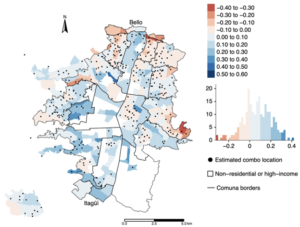In 2022, an American dressed in his pajamas took down North Korea’s internet from his living room. Fortunately, there was no reprisal against the United States. But Kim Jong Un and his generals must have weighed retaliation and asked themselves whether the so-called independent hacker was a front for a planned and official American attack.In 2023, the world might not get so lucky. There will almost certainly be a major cyberattack. It could shut down Taiwan’s airports and trains, paralyze British military computers, or swing a US election. This is terrifying, because each time this happens, there is a small risk that the aggrieved side will respond aggressively, maybe at the wrong party, and (worst of all) even if it carries the risk of nuclear escalation. This is because cyber weapons are
Read More »Articles by Chris Blattman
The Hard Truth About Long Wars: Why the Conflict in Ukraine Won’t End Anytime Soon
November 29, 2022When Russia invaded Ukraine in February, few observers imagined that the war would still be raging today. Russian planners did not account for the stern resistance of Ukrainian forces, the enthusiastic support Ukraine would receive from Europe and North America, or the various shortcomings of their own military. Both sides are now dug in, and the fighting could carry on for months, if not years.
Why is this war dragging on? Most conflicts are brief. Over the last two centuries, most wars have lasted an average of three to four months. That brevity owes much to the fact that war is the worst way to settle political differences. As the costs of fighting become apparent, adversaries usually look for a settlement.
Many wars, of course, do last longer. Compromise fails to materialize for
Read More »Presentation to the Joint Chiefs Operations Directorate
November 11, 2022[unable to retrieve full-text content]A 30-minute lecture on the book, followed by Q&A
The post Presentation to the Joint Chiefs Operations Directorate appeared first on Chris Blattman.
Spectator picks WWF as a best book of 2022
November 10, 2022Philip Hensher
There were some very good novels this year, but they came from surprising directions. It is astonishing that one as original as Kate Barker-Mawjee’s The Coldest Place on Earth (Conrad Press, £9.99) couldn’t find a major publisher. A friend recommended this wonderfully controlled and evocatively written novel about a heart coming to life in the depths of Siberia.
I always enjoy Mick Herron’s half-arsed spy thrillers, but Bad Actors (Hodder & Stoughton, £18.99) took a big step into literary excellence. The dazzling, Conrad-like structure turned an entertainment into a major literary statement. Sheila Llewellyn’s Winter in Tabriz (Hodder & Stoughton, £8.99) was a revelation – long considered and slowly overwhelming with its sense of time and place (Iran, 1979).
Read More »From street fights to world wars: What gang violence can teach us about conflict
November 10, 2022Episode 65 of the Irregular Warfare Podcast explores why violence occurs from the local to the geopolitical level and how conflict can revert back to peace.
Our guests today begin by asserting that peace—and not war—is the natural order of things for the human race. They then propose and identify five theoretical mechanisms that cause breakdowns in societies and discuss why different groups end up resorting to violence. Our guests then compare and contrast the characteristics of violence at the interpersonal, communal, and international levels. Finally, they end by discussing how third-party mediation at the local and transnational echelons can effectively employ peace-building mechanisms to bring an end to violence at all levels.
Dr. Chris Blattman is an economist and
Read More »The prospects for war with China: Why I see a serious chance of World War III in the next decade
October 27, 2022When I wrote my book on war, I avoided ongoing conflicts because I didn’t want the book to be dated the moment it came out. The roots of war and the paths to peace are timeless, and I wanted examples that made this permanence clear. Still, it was hard not to read obsessively about the conflicts facing today’s world and develop opinions. Over the next few months I plan to write a series on some of the most troublesome conflicts, and what I think social science has to say about them.
I’ll begin with the one that worries me most, by far: a Chinese invasion of Taiwan, one that draws the United States and its Pacific allies into prolonged fighting. In other words: World War III.
As many of you know, I am no China expert. Instead, this is what I gleaned from trying read as much as possible.
When is War Justified?
October 24, 2022Oct 24, 2022 12:00 pm
53:02 mins
Most Americans have never fought in a war, or even had our lives disrupted by one. Does being so far removed from the loss and trauma make us more willing to send our military into battle? This is the first of two episodes we’re dedicating to thinking more deeply about the consequences of war. Rarely is going to war clearly the right or wrong choice. When is war justified? We’re hoping that, by really embracing the nuance here, we’ll be more clear-eyed as citizens and voters the next time America has the choice to fight. (AP Photo/Balint Szlanko, File)
Guests:
Sonny Le, former refugee from Vietnam, Bay Area Regional Program Manager of Vaccinate ALL 58
Yalda Royan, refugee from Afghanistan, founding member of the Afghan Women’s
Read More »Conversation with Teny Gross on Gang Violence
October 20, 2022[unable to retrieve full-text content]The post Conversation with Teny Gross on Gang Violence appeared first on Chris Blattman.
Read More »Vox FuturePerfect50
October 20, 2022Chris Blattman is an economist and political scientist at the University of Chicago, but he’s not the type to dwell in an ivory tower working purely on theoretical questions. Instead, he does empirical work that gathers data from the real world — which then influences the real world in turn.
His recent research focuses on violence, asking questions like: Why do people fight? How can we reduce the chance that criminal violence or war will spring up or stop it once it has?
He’s explored these questions in far-flung communities, from drug gangs in Colombia to child soldiers in Uganda to criminals in post-war Liberia. And this year he brought together his findings in a new book, Why We Fight.
One study that Blattman and co-authors ran in Liberia deserves special mention. It recruited
The 5 reasons wars happen
October 14, 2022Whether it is Russian President Vladimir Putin’s threats of nuclear strikes or Chinese belligerence in the Taiwan Strait, the United States seems closer to a great power war than at any time in recent decades. But while the risks are real and the United States must prepare for each of these conflicts, by focusing on the times states fight—and ignoring the times they resolve their conflicts peacefully and prevent escalation—analysts and policymakers risk misjudging our rivals and pursuing the wrong paths to peace.
The fact is that fighting—at all levels from irregular warfare to large-scale combat operations—is ruinous and so nations do their best to avoid open conflict. The costs of war also mean that when they do fight countries have powerful incentives not to escalate and
Read More »The roots of war: To discern why we fight, we should ask why we do not
October 14, 2022Checking if the site connection is secure
Enable JavaScript and cookies to continue
www.bostonreview.net needs to review the security of your connection before proceeding.
Read More »Advanced Master’s & PhDs
September 10, 2022Why We Fight fits well as a unit within a graduate seminar on conflict, international relations, economic development, political economy, or comparative politics.
2–3 Week Unit
For example, I teach conflict theory and empirics in 3–4 lectures of a longer seminar for economics PhD students called Political Economy of Development, with James Robinson (syllabus). I like to teach a mix of classic theory and very current (often unpublished) papers to give students a feel for both the canon and the frontier.
Here are the lecture slides I used in Spring 2021:
Rationalist warfare [pdf] [tex] picks up on the material in Chapters 1, 2, 4 and 5
Non-standard theories of fighting [pdf] [tex] picks up on material in Chapters 2, 3, and 6
Frontiers of violence research [pdf] [tex] picks up on some of
Advanced Master’s & PhDs
September 10, 2022I use Why We Fight in my undergrad international development class [syllabus], an intro-level course in an interdisciplinary major. Students love it, both the ideas and because the anecdotes gave them a sense of how development work and research are conducted. I’ve enjoyed it a lot myself. —Penn State sociologist Brian Thede
Graduate students and scholars will benefit from the way that Blattman organizes a vast literature. I would wholeheartedly recommend this as *the* book for those either starting war studies or working in relevant fields. —NYU political scientist Cyrus Samii
x
Why We Fight can work as a short unit on conflict within a longer class on economic development, international relations, political economy, comparative politics, or conflict studies. Below are sample
Read More »Undergrad & Master’s
September 10, 2022Why We Fight can work as a short unit on conflict within a longer class on economic development, international relations, political economy, comparative politics, or conflict studies. Here are some ideas and resources to do so.
1 week Unit
I’d recommend having students engage with Part I of the book only, especially chapters 1–5. This will give them a good overview of the causes of war literature.
You could use a selection of the slides below to walk students through the strategic concepts in lectures. Alternatively, students have enjoyed small group work, where they met in or out of class to apply the concepts to a familiar case (e.g. wars in Iraq, Afghanistan, Ukraine, or tensions between China and Taiwan) and then present back ideas to the class.
2–4 Week Unit
I’ve taught the
High school
September 10, 2022My students love the book. One thing that jumps out is how clearly Blattman writes. For high school students who are encountering a big topic for the first time, clarity is incredibly important. The book really speaks to a wide audience.—Matt Cone, Carrboro High School, Carrboro, North CarolinaI tried to make Why We Fight as simple and accessible and story-driven as possible. I’m eager to hear from high school teachers who would like to use the book, and to help where I can.I met with Matt Cone and his class at Carrboro High School in Carrboro, North Carolina, and here were some suggestions from Matt and his students.
Read More »High school
September 10, 2022For high school students who are encountering a complex topic for the first time, clarity is incredibly important. That’s why I tried to make Why We Fight as simple and accessible and story-driven as possible.
I plan to develop more high school materials, and would love to hear from teachers. I met with Matt Cone and his class at Carrboro High School in Carrboro, North Carolina, and here were some suggestions from Matt and his students.
Ask students to videotape themselves answering basic questions at the start of a unit, to transcribe their answers, and to reflect upon these answers at the end of the unit. Alternatively, they could work these out in small groups. Reflecting on their early answers can help students become more aware of how much their thinking has sharpened over the
Center for Strategic & International Studies
September 7, 2022[unable to retrieve full-text content]An interview by Erol Yaboke
The post Center for Strategic & International Studies appeared first on Chris Blattman.
If we elected more women would there be less war? Yes but not for the reasons you think
September 7, 2022Liz Truss is the United Kingdom’s new prime minister—that brings the number of female leaders in the G20 to two. She enters world politics at a tense moment: Russian President Vladimir Putin’s invasion of Ukraine looks unlikely to end anytime soon, and tensions in the Taiwan Strait are greater than ever. The risk of a great power war between the West and Russia or China seems greater than any point in 30 years.Maybe what we need is more women in charge, and fewer macho men. Surely that would make for a more peaceful world? The social science says yes, but maybe not for the reasons you think.The idea goes far back. Start with one of the most famous plays of all time, Aristophanes’ Lysistrata, still performed today. Women in Athens couldn’t vote, but a war was killing their sons, brothers,
Read More »Predicting and preventing violent crime before it happens
September 6, 2022All of us want to feel safe in our daily lives. Yet when we think about crime, our first response is often a blanket approach: find the bad guys, and punish them. But what if there were another way? This week on the show, researchers Sara Heller and Chris Blattman explore how technology and psychology can be used to radically transform our approach to crime.
Additional Resources
“Social Networks and the Risk of Gunshot Injury,” by Andrew Papachristos, Anthony Braga, David Hureau in the Journal of Urban Health, June 2012
“Machine Learning Can Predict Shooting Victimization Well Enough to Help Prevent It,” by Sara B. Heller, Benjamin Jakubowski, Zubin Jelveh & Max Kapustin, National Bureau of Economic Research, June 2022
“Thinking Fast and Slow? Some Field Experiments to Reduce Crime and
How to cut short the long slog in Ukraine
August 14, 2022James Stavridis, the former NATO supreme allied commander for Europe, recently predicted that the Russia-Ukraine conflict would end this year. Some experts, such as Stavridis, expect a stalemate and frozen conflict. Others hope for negotiations to begin. After all, this is what usually happens. War is brutally expensive and exhausting, so most conflicts are brief. Over the last century, the average war was just 100 days long.
Unfortunately, some wars last because sustaining the fight is strategic — it is each side’s best option, despite the horrendous cost. Historically, two strategic logics drive long wars. Unfortunately, both appear in the current crisis, making a frozen conflict or negotiations more difficult to achieve.
The first logic is deterrence through reputation.
Read More »Interview in Die Zeit (Germany)
August 11, 2022Zeit.de Pur
Nutzen Sie zeit.de mit weniger Werbung und ohne Werbetracking für 1,20 €/Woche (für Digital-Abonnenten nur 0,40 €/Woche).
Bereits PUR-Abonnent?
Hier anmelden.
The terrible trade-off: Why governments must choose between more violence or stronger gangs
July 22, 2022Nearly every neighborhood in Medellín, Colombia, has a combo, or local street gang—almost four hundred in all. They earn most of their money from local drug sales. Some also run protection rackets, while others market legal goods—arepas, eggs, and even cooking gas—to locals. All these revenues make each Medellín neighborhood a valuable prize for combos to control.
That competition for prime territory should be a recipe for violence. Yet the city has an annual homicide rate far lower than that of cities like Chicago. Why?
The short answer is that Medellín’s gangs have learned how to cooperate rather than fight. Unfortunately, Medellín’s relative peace comes at a hidden price: less violence in return for stronger, better organized, and more popular gangs.
Collectively, we
Read More »The work habits of highly successful mathematicians, mostly to make you feel bad about your day today
July 13, 2022On any given day, Huh does about three hours of focused work. He might think about a math problem, or prepare to lecture a classroom of students, or schedule doctor’s appointments for his two sons. “Then I’m exhausted,” he said. “Doing something that’s valuable, meaningful, creative” — or a task that he doesn’t particularly want to do, like scheduling those appointments — “takes away a lot of your energy.”
To hear him tell it, he doesn’t usually have much control over what he decides to focus on in those three hours. For a few months in the spring of 2019, all he did was read. He felt an urge to revisit books he’d first encountered when he was younger — including Meditations by the Roman emperor Marcus Aurelius and several novels by the German author Hermann Hesse — so that’s what he did.
Russian soldier gangsterism, cricket scams, optical illusions, and other links I liked
July 12, 20221. Scam of the day (Indian cricket edition): “I have never seen a scam like this. These guys just cleared a patch of land deep inside a village and began playing a match and beaming it on YouTube to make money through gambling. …We know very little about the Russians who were putting bets on this”
2. A good story on Russian repression and Ukrainian resistance inside occupied areas of Ukraine. Some Russian actions look an awful lot like how gangs and militias try to foster civilian collaboration through speedy justice for hire:
at the same time, the Russians also try to ingratiate themselves. Key to their efforts is the concept of what they call “swift justice”. The principle is simple: justice through the courts can take forever, so why not let them deliver it instead? Of course, it’s
America’s path to war with Russia
July 10, 2022That’s the title of my feature with RealClearDefense, published this weekend. Full text follows here.
The Biden administration has worked hard to keep Russia from treating America as a co-combatant in Ukraine. But that doesn’t mean NATO isn’t deeply embroiled in the fight. The level of support is extraordinary and increasing, including sanctions, intelligence sharing, weapons transfers, and money. Add to that the ever-heightening political rhetoric: “The United States is in this to win it,” one US Congressman tweeted from Kyiv.
But nothing in international law stops Russia from changing its mind and treating the United States as an active party to the conflict. Instead of providing bright red lines, the conventions are fuzzy and subjective. The fact that Vladimir Putin hasn’t deemed
Acht Wochen Verhaltenstherapie und 200 Dollar verändern das Leben gewalttätiger Männer in Liberia nachhaltig
July 10, 2022Erstmals haben Forscher gezeigt, dass Verhaltenstherapie bei Erwachsenen mit krimineller Vergangenheit auch 10 Jahre später noch wirkt: Im Durchschnitt konnten so 338 Straftaten verhindert werden – pro Person. Strassenverkäufer in Liberia, Juni 2021. Zohra Bensemra / ReutersWer in einem Umfeld von Gewalt aufgewachsen ist, ändert sein eigenes kriminelles Verhalten selten. So lautet die gängige Meinung. Auch Forscher sagen, antisozialem Verhalten sei im Erwachsenenalter schwer beizukommen. Doch seit kurzem gibt es ein beeindruckendes Gegenbeispiel aus Monrovia, der Hauptstadt von Liberia an der Westküste Afrikas. Dieses Gegenbeispiel wurde von Forschern der Harvard Medical School und des Massachusetts Institute of Technology (MIT) geliefert. Das am MIT angesiedelte Poverty Action
Read More »America’s Path to War With Russia
July 9, 2022[unable to retrieve full-text content]Feature in RealClearDefense
The post America’s Path to War With Russia appeared first on Chris Blattman.
Two articles on Russia and Ukraine
July 9, 2022Between 1998 and 2003, Ksenia Yudaeva and Konstantin Sonin were colleagues, first at the Russian-European Center for Economic Policy and then at the Center for Economic and Financial Research and Development. After Russia invaded Ukraine in February 2022, Sonin (now a professor at the University of Chicago) reached out to Yudaeva (who today serves as the first deputy governor of the Central Bank). Fearing data insecurity on Facebook and Telegram, she asked him to install Signal.
When they finally connected using the encrypted instant messenger, Sonin warned Yudaeva that staying with Russia’s Central Bank is tantamount to supporting the invasion of Ukraine. The bank’s currency-transaction controls (later softened gradually but not lifted entirely) and other wartime interventions
The United States is not headed for civil war
July 5, 2022Now, those prophesizing war have a point. If you take civil conflict from recent history, you find a chillingly familiar list of initial conditions: politics hardening along identity lines; a surge of armed groups; an erosion of institutions. Ethnic polarization and democratic backsliding are especially persistent predictors of state collapse.
But apply this to the United States with care. The data driving these results comes from predicting massive acts of violence – genocide or revolutionary wars – almost all from low- and middle-income countries. It’s dubious to use these models to predict a different phenomenon – low-scale insurgency – in America or other rich, advanced democracies.
America’s democracy numbers also don’t add up. In 2015, raters like the Polity Project gave the United
Intelligence Squared podcast
July 4, 202259 min
PLAY
Christopher Blattman is an economist, political scientist and Ramalee E. Pearson Professor of Global Conflict Studies at The University of Chicago. His new book is Why We Fight: The Roots of War and the Paths to Peace, which explores why societies turn to violence and how poverty and oppression often go hand in hand with conflict. Chris’s work has taken him from studying poverty in Uganda to street gangs in Medellin, investigating the likes of dictators, monarchs, mobs and football hooligans along the way. Joining him to discuss the book is our host,
Read More »



